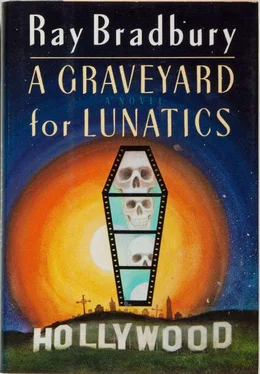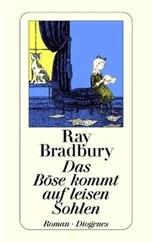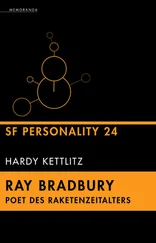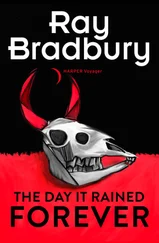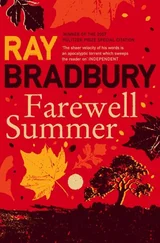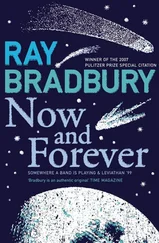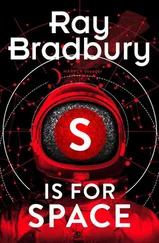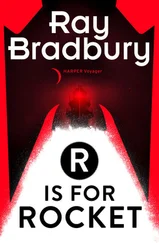The Beast’s massive shadow drifted on the incline going down, as he turned.
He gazed at me steadily out of his incredibly wild, incredibly sad eyes.
He nodded down the incline at darkness. “Well, if you can’t walk, then run,” he murmured.
“From what ?”
The mouth munched wetly on itself and at last pronounced it: “Me! I’ve run all my life! You think I can’t follow? God! Pretend! Pretend I’m still strong, that I still have power. That I can kill you. Act afraid!”
“I am!”
“Then run! God damn you!”
He raised one fist to knock shadows off the walls.
I ran.
He followed.
It was a dreadful pretend pursuit, through the vaults where all the film reels lay, toward the stone crypts where all the stars from those films hid, and under the wall and through the wall, and suddenly it was behind, and I was ricocheted through catacombs with the Beast flooding his flesh at my heels toward the tomb where J. C. Arbuthnot had never lain.
And I knew, running, it was no tour, sweet Jesus, but a destination. I was not being pursued but herded. To what?
The bottom of the vault where Crumley and blind Henry and I had stood a thousand years ago. I jolted to a halt.
The sarcophagus platform steps waited, empty, in place.
Behind me I felt the dark tunnel churn with footfalls and the fire bellows roar of pursuit.
I jumped on the steps, reaching somehow to climb. Slipping, crying insipid prayers, I groaned to the top, cried out with relief, and shouted myself out of the sarcophagus, onto the floor.
I hit the tomb door. It burst wide. I fell out into the graveyard and stared wildly along through the stones at the boulevard, miles off and empty.
“Crumley!” I yelled.
There was no traffic, no cars parked.
“Oh, God,” I mourned. “Crumley! Where ?”
Behind me there was a riot of feet clubbing the tomb entry. I whirled.
The Beast stepped into the doorway.
He was framed in moonlight. He stood like a mortuary statue reared to celebrate himself, under his carved name. For one moment he seemed like the ghost of some English lord posed on the sill of his ancient country gatehouse, primed to be trapped on film and immersed in darkroom acid waters to rise phantom-like as the film developed in mists, one hand on the door hinge to his right, the other upraised as if to hurl Doom across the cold marble gameyard. Above the cold marble door I once again saw:
ARBUTHNOT.
I must have half cried aloud that name.
At that he fell forward as if someone had fired a starter’s gun. His cry spun me to flounder toward the gate. I caromed off a dozen gravestones, scattered floral displays, and ran, yelling, on a double track. Half of me saw this as manhunt, the other as Keystone farce. One image was broken floodgate tides lapping a lone runner. The other was elephants stampeding Charlie Chase. With no choosing between maniac laughters and despairs, I made it down brick paths between graves to find:
No Crumley. An empty boulevard.
Across the street, St. Sebastian’s was open, lights on, the doors wide.
J. C., I thought, if only you were there!
I leaped. Tasting blood, I ran.
I heard the great clumsy thud of shoes behind, and the gasping breath of a half-blind terrible man.
I reached the door.
Sanctuary!
But the church was empty.
Candles were lit on the golden altar. Candles burned in the grottos where Christ hid so as to give Mary center stage amidst the bright drippings of love.
The doors to the confessional stood wide.
There was a thunder of footfalls.
I leaped into the confessional, slammed the door, and sank, hideously shivering, in the dark well.
The thunder of footsteps—
Paused like a storm. Like a storm, they grew calm and then, with a weather change, approached.
I felt the Beast paw at the door. It was not locked.
But I was the priest, was I not?
Whoever was locked in here was most holy, to be reckoned with, spoken to, and stay— safe ?
I heard this ungodly groan of exhaustion and self-doom from outside. I shuddered. I broke my teeth with prayer for the merest things. One more hour with Peg. To leave a child. Trifles. Things larger than midnight, or as great as some possible dawn
The sweet smell of life must have escaped my nostrils. It came forth with my prayers.
There was a last groan and—
God!
The Beast stumbled into the other half of the booth!
His cramming and forcing his lost rage in shuddered me more, as if I feared that his terrible breath might burn through the lattice to blind me. But his huge bulk plunged to settle like a great furnace bellows sighing down on its creases and valves.
And I knew the strange pursuit was over, and a final time begun.
I heard the Beast suck breath once, twice, three times, as if daring himself to speak, or fearful to speak, still wanting to kill, but tired, oh God, at last tired.
And at last he whispered an immense whisper, like a vast sigh down a chimney: “Bless me, father, for I have sinned!”
Lord, I thought, dear God, what did priests say in all those old films half a lifetime ago? From stupid remembrance, what!?
I had this mad desire to fling myself out to sprint down the middle of nothing with the Beast in fresh flight.
But as I seized my breath, he let forth a dreadful whisper:
“Bless me, father—”
“I’m not your father,” I cried.
“No,” whispered the Beast.
And after a lost moment, added: “You’re my son.”
I gave a jump and listened to my heart knock down a cold tunnel into darkness.
The Beast stirred.
“Who—” pause “— do you think—” pause “— hired you?”
Dear God!
“I,” said the lost face behind the grille, “did.”
Not Groc? I thought.
And the Beast began to tell a terrible rosary of dark beads, and I could not but slowly, slowly sink back and back until my head rested on the paneling of the booth, and I turned my head and murmured:
“Why didn’t you kill me?”
“That was never my wish. Your friend stumbled on me. He made that bust. Madness. I would have killed him, yes, but he killed himself first. Or made it look as if. He’s alive, waiting for you—”
Where!? I wanted to shout. Instead I said: “Why have you saved me?”
“Why— One day I want my story told. You were the only one,” he paused, “— who could tell it, and tell it— right. There is nothing in the studio I do not know, or out in the world I do not know. I read all night long and slept in snatches and read more and then whispered through the wall, oh, not so many weeks ago: your name. He’ll do, I said. Get him. That is my historian. And my son.
“And it was so.”
His whisper, behind a mirror, had given me nomination.
And the whisper was here now, not fourteen inches off, and his breath pulsing the air like a bellows, between.
“Sweet Jerusalem’s bone-white hills,” said the pale voice. “I hired and fired, all and everyone, for thousands of days. Who else could do it? What else had I to do but be ugly and want to die. It was my work that kept me alive. Hiring you was a strange sustenance.”
Should I thank him? I wondered.
Soon, he almost whispered. Then:
“I ran the place at first, secondhand, behind the mirror. I knocked Leiber’s eardrums with my voice, predictions on markets, script editings, scanned in the tombs, and delivered to his cheek when he leaned against the wall at two A.M. What meetings! What twins! Ego and super-ego. The horn and the player of the horn. The small dancer. But I the choreographer under glass. My God, we shared his office. He making faces and pretending great decisions, I waiting each night to step forth from behind to sit in the chair by the empty desk with the single phone and dictate to Leiber, my secretary.”
Читать дальше
Конец ознакомительного отрывка
Купить книгу
